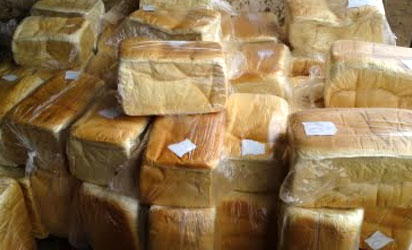August 1, 2022

…Bakers list pain points as capacity utilization declines
…Prices rise 50% this year, 25% last month
Available data has shown that Nigeria imported about 99 percent of its wheat requirement in the first quarter of 2022 (Q1’22), and with the attendant foreign exchange (forex) demand pressure, this has been fingered as one of the major factors responsible for the ongoing bread crisis in Nigeria.
ADVERTISING
Financial Vanguard findings also show that bakers and other confectionary industry operators have marked up their product prices about four times this year.
As at last week the series of price mark ups have seen the average retail price of bread go up by as much as 50 percent this year.
The Federal Ministry of Agriculture and Rural Development estimated Nigeria’s national wheat requirement at 5 million metric tons, and the National Bureau of Statistics (NBS) reported that the country produced only 36,943 metric tons of wheat in 2021, representing less than one percent of the country’s total annual demand.
According to NBS, wheat was Nigeria’s second most imported goods in Q1’22, accounting for N258.3 billion of the value of total imports in the period.
A 50kg bag of flour now goes for about N30,000 as against N12,600 in January 2021, representing an increase of 138 percent.
Recall that bakers had embarked on a withdrawal of services for four days last week, in a move to draw attention to the crises and ensure the survival of the bread industry in Nigeria.
According to the National Secretary of the Association of Master Bakers and Caterers of Nigeria, Jude Okafor, high production cost forced the bakers to close shop.
In a chat with Financial Vanguard, President, Premium Breadmakers Association of Nigeria (PBAN), Engr Emmanuel Onuorah, lamented the huge differential between import and in-country growing in the nation’s wheat requirement, noting that the foreign exchange (forex) needed to fill the gap through importation is much, in addition to other factors aggravating the cost of producing bread in Nigeria.
He lamented that the escalating cost of production has pushed down the capacity utilisation of an average bakery in Nigeria.
Cost factors
Onuorah said that there are several factors contributing to the rising cost in bread value chain.
His words: “In bread making, our inputs are 100 percent imported because the wheat flour that we use majorly comes from Russia. It is not us but the millers because we don’t deal with wheat, we deal with their finished product. And from what we got from them, they are getting most of the wheat from Russia, Ukraine and some part of Argentina.
“From what the millers are telling us, the government does not give them forex concessions. So what they do is that they begin to source from the parallel market. And you know what goes with sourcing outside the government window, you get it at an exorbitant rate.
“Outside of that, there is a levy they call 15 percent wheat development levy. This levy was started by the Jonathan administration, it was supposed to be a stop gap for two years. The essence of this 15 percent wheat development levy was to help grow wheat in the country.
“Apart from that, the government also puts 15 percent duty on wheat import, so cumulatively what they are seeing at wheat import duty is 30 percent. So you can see that it becomes a lot of a problem.
“On top of that, diesel prices increased, and so what you see is spiraling costs of production.
“Flour is going for between N29,000 and N30,000 today, the same thing with sugar, softener, and egg that we used to buy at N800 per crate before is now N2,200 depending on the size, smaller size is N2,000. Yeast that we used to buy between N5,000 and N7,000 before is now N21,000, Calcium Sulfate that we buy for N29,000 before is now about N54,000, and the list goes on.
“The worst thing is that flour constitutes about 65 to 70 percent of our inputs, sugar does about 6 to 8 percent. Regularly, weekly or bimonthly for the past one year, they keep increasing flour prices.
“In the face of all these, diesel now skyrocketed, from N250, diesel is hitting N850 in Lagos, even higher in some places. It is a mixed bag for us.
“We also contend with the problem of regulatory agencies, NAFDAC and SON are regulating us, in the state, touts too are disturbing – they come to bakeries to disturb, when vehicles are passing they break windscreen and side mirrors.”
He added, for instance, that it was wrong for NAFDAC to be charging bakers a N154,000 penalty on late renewal of certificates.
Running at a loss
Onuorah declared that the bakeries’ capacity has dropped to 70 percent, adding that they can no longer have the turnover required to be able to break even and some are closing down.
“In my bakery, I used to have 150 staff, today I have only 45, because my throughput has dropped. I was doing three shifts in 24 hours before, now I am doing 12 hours.
“We just put 10 percent on our bread for premium bread makers. As it is, from our costing template, we have a deficit on the big loaf, a deficit of N6.62 while for the sliced bread we have about N12 plus. We did 10 percent, the master bakers did 20 percent because they are a different association.”
Demands
“We withdrew our services because we wanted to bring our challenges to the fore, to the government and Nigerians.
“It has been very tough with us as businesses. We take loans from banks and default on repayments. But bankers are not willing to give us any lifeline any longer. That is why we want the federal government to look at our side.
“Government should remove the 15 percent wheat development levy charged on imports; the government should stop multi agency regulation.
“We are Micro Small and Medium Enterprises (MSMEs), so there is no need for us to be having multiple taxation in the form of every agency coming to regulate us.
“The government should stop charging a 15 percent wheat development levy on imports, and have a downward review of the N154,000 penalties charged to bakeries on late renewal of certificates by NAFDAC.”
The bakers further called on the government to grant them access to grants and soft loans under the Central Bank of Nigeria (CBN) intervention programmes.
“We are asking for loans and grants that the CBN is giving to MSMEs. Are we not small? They should give us too.”
No govt response
Chairman, Association of Master Bakers and Caterers of Nigeria, Kogi, Gabriel Bamidele-Adeniyi, believed that they have passed their message across.
“Although the federal government is yet to respond to our pleas and demands, we are satisfied that we have at least sent a message hoping for a positive result,” he stated.
Market survey
Two bread vendors in Festac and Surulere areas in Lagos, who do not want to be named, in separate chats with Financial Vanguard, lamented that they have experienced a drop in patronage since the increase in the price of bread, adding that they have also reduced their demands from bakeries.
A survey conducted around the area showed that prices of bread increased by between 20 and 25 percent for regular low income brands in the past one week. A loaf of bread that previously sold for N200 now cost N250, that of N500 now cost N600, that of N600, now N750, that of N700 now cost N900, while that of N800 now cost between N950 and N1,000.
A retiree identifying himself as Mr. Johnson, told Financial Vanguard that with the latest development, he may be forced to abandon bread completely because he will now require about N2,000 everyday to buy bread for his family of five, amounting to N60,000 per month. “I just cannot afford this, my meager pension is not sufficient for that,” he stated.






